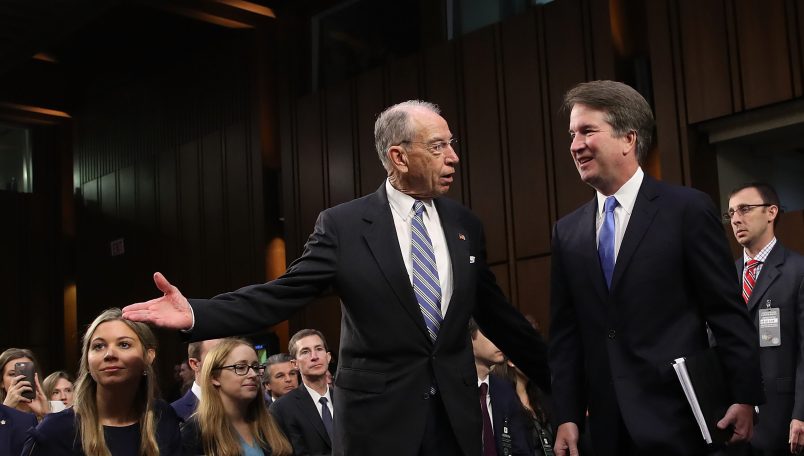An FBI report on sexual misconduct allegations against Judge Brett Kavanaugh has the potential to change the trajectory of his confirmation — and in turn, possibly, the direction of the Supreme Court for a generation to come.
But just what will be made known to the public about what the FBI found in its background investigation into the allegations is still up for debate as the Senate awaits the report, which is expected to be completed no later than this Friday.
Some lawmakers, including some Republicans, are calling for the release of the full report, even though background investigations are usually kept confidential given their sensitive natures and the candor they require of their participants.
Other Republicans are calling for a summary of some sort, so they can assure the public that the FBI was thorough in its probe and, if it finds no new evidence to back up the allegations, so they can clear the air around the nominee.
Judiciary Chairman Chuck Grassley (R-IA) gave no indication that his committee plans to deviate from its policy of keeping the background investigation report, known as a “BI,” private — though, in this case, it will be available to every senator and not just the members of his committee.
It’s unclear if he’d be opposed to putting out a summary, as many of his colleagues are calling for. His spokespeople did not respond to TPM’s inquiry. Who writes such a summary and what it documents could lead to further scrutiny about whether Senate Republicans are being up front about what the FBI found.
Majority Leader Mitch McConnell (R-KY) said at his regular press conference Tuesday that the report “will be made available to each senator and only senators will be allowed to look at it.”
He wouldn’t say how long he’d wait after the FBI completed it to proceed to a floor vote on Kavanaugh’s confirmation, which he has promised will happen this week.
“As interesting as this all is, I can’t imagine that any members who want to read it will not go over there and read it immediately,” McConnell said, adding it will “not be used as another reason for delay.”
Minority Leader Chuck Schumer (D-NY), meanwhile, called for the report to be released publicly, while also demanding the release of the directive the White House gave the FBI in ordering the probe and asking for an all-Senate briefing by the FBI agent who led the investigation.
“Almost every step they take, it seems they have something to hide,” Schumer said of GOP lawmakers.
Sen. Patrick Leahy (D-VT), a member of the Judiciary Committee who was once its chairman, told reporters that “because the credibility of both the Senate and the U.S. Supreme Court is at stake, the public should see it all.”
He has at least one other Judiciary Republican on his side.
“They need to see it all,” Sen. John Kennedy (R-LA) told reporters. “It’s not my call, but I think they need to see it. … I trust the American people to decide and draw their own conclusions.”
Sen. Bob Corker (R-TN) — who is not on the Judiciary Committee, but was one of the Republicans who requested that Kavanaugh’s first accuser be allowed to testify on her allegations — said that he would “love” for it to be made fully public, while acknowledging that he didn’t know what the precedent was.
“I am afraid that if we don’t make it public, each side will be, you know, very selective in what they share with you all,” Corker said, referring to the press. “It will damage further what has happened.”
While Democrats have started to rally around publicly releasing it, the top Democrat on the Judiciary Committee, at least at first, was reluctant to make such a promise.
.@SenFeinstein indicates that the FBI report on Kavanaugh should NOT be made public: “It would seem to me that if people are going to be identified this ought to be held very close and not.”
“I think the investigation ought to be closely held,” she reiterated.
— Elizabeth Landers (@ElizLanders) October 2, 2018
Her Republican counterpart stressed that keeping background reports confidential had been standard operating procedure for decades.
“If you want people to be candid with the FBI and cooperate with the FBI, there may be some people who want to say something who don’t any connection to that,” Grassley told reporters. “If you did anything different than [what’s] been done in all the years I’ve been in the Senate, you might actually hurt the FBI getting the information it wants.”
Cameron Joseph and Caitlin MacNeal contributed reporting.







The findings will be made public through leaks. GOP doesn’t have a good story to tell. There isn’t any evidence exonerating Kavanaugh. The Ramirez allegations and additional witnesses will be in the record.
I’d also note that there is a shift today by Republicans to actually use a FBI report as a jumping off point to part ways with Kavanaugh. If Kavanaugh has any political sense at all, he’ll jump ship.
Could you please explain what you mean here? Do you mean the forthcoming FBI report?
Of course it shouldn’t be made public. How could Senate Republicans ever justify destroying this poor, honest, wonderful man’s life by allowing the public to know what a total douchebag he really is? Brett Kavanaugh must be protected from the truth.
In that case, it’ll be leaked five minutes before it even exists.